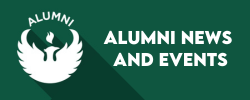Recent Alum Amanda Hartlaub (’23) Wants Rural Communities to Feel Empowered About Their Health
During the fall semester of 2022, Amanda Hartlaub, a double major in Business Administration and Human Biology, approached Professor Brian Merkel with an idea. After taking mostly virtual classes since 2020, Hartlaub had not yet met her faculty advisor in person when she knocked on his office door.
The COVID-19 pandemic that necessitated virtual learning also piqued Hartlaub’s interest in how health information can be communicated. Coming from a small town and working with rural patients at an assisted living facility made her aware of the unique health concerns in rural communities. Hartlaub’s education and experience, alongside a desire to give back to her local community, culminated in a question—how do we reach rural communities with health information? By hosting a series of rural health outreach forums, Hartlaub is working toward an answer.
Bridging the Gap
The idea of a rural health outreach forum began with a knock on an office door. After introducing herself to Professor Merkel, Hartlaub explained her idea to bridge the gap between professional and academic experts and rural audiences. “You’re either in the inside or you’re on the outside,” said Hartlaub, referring to that disconnect, “And I don’t like that because I want people to feel empowered about their health and to be able to ask questions.”
Merkel jumped on board. So did Professor James Kabrhel, who had taught Amanda at UW-Green Bay’s Sheboygan campus. “I do a lot of discussion of scientific information and pseudoscience in my classes, so there was a natural fit there,” said Kabrhel. After considering the best avenues to reach people, the group came up with the idea of a forum as a way to make sharing health information a conversation, a two-way street.
The forum, which took place last November at Sheboygan’s Mead Public Library, included experts with a range of focus areas. The event featured Merkel talking about vaccines, Kabrhel discussing misinformation and scientific information literacy, UW-Green Bay and Medical College of Wisconsin Professor Debra Pearson’s focus on nutrition and Wisconsin Academy for Rural Medicine student Tony Tobniak speaking on mental health. Hartlaub moderated discussion. While the event was well-received, attendance was lower than the group had hoped. Still, they plan to schedule more forums and bolster attendance through more robust advertising and partnerships.
Looking Toward the Future
Hartlaub doesn’t yet know where this interest in rural health will take her. She works at Acuity in Sheboygan, but she is considering graduate school at the Medical College of Wisconsin. Kabrhel said Hartlaub is, “really invested in supporting the local community,” wherever her path takes her.
Hartlaub is a strong believer in accepting the unknowns along one’s path. A first-generation student, she said she took the “scenic route” through her degree, completing a double major in five years while commuting to classes at both the Green Bay and Sheboygan campuses as well as taking online courses.
“The whole premise of getting this education is that you’re not just getting the job,” said Hartlaub, “You’re giving back or, you know, enriching the area you live in.”
Instead of focusing on a singular career outcome, Hartlaub said she emphasized pursuing her interests, learning about herself, developing relationships, and finding ways to support the community she came from. “The whole premise of getting this education is that you’re not just getting the job,” said Hartlaub, “You’re giving back or, you know, enriching the area you live in.”
Hartlaub said her philosophy of helping people is simple: “You can do a little bit where you are. If everyone did a little bit where they were, eventually it would all connect together and everything would just be a little bit better.”



